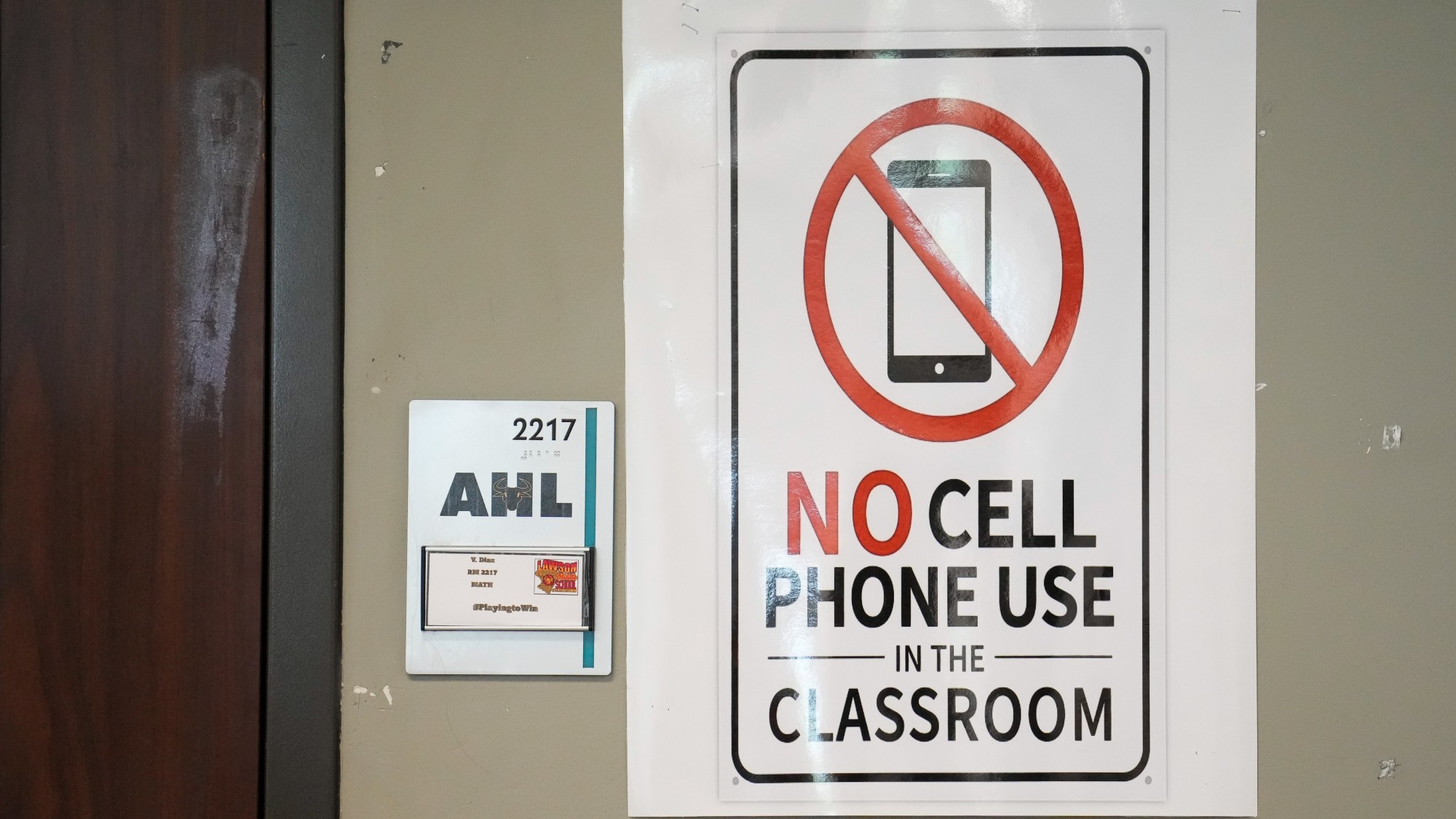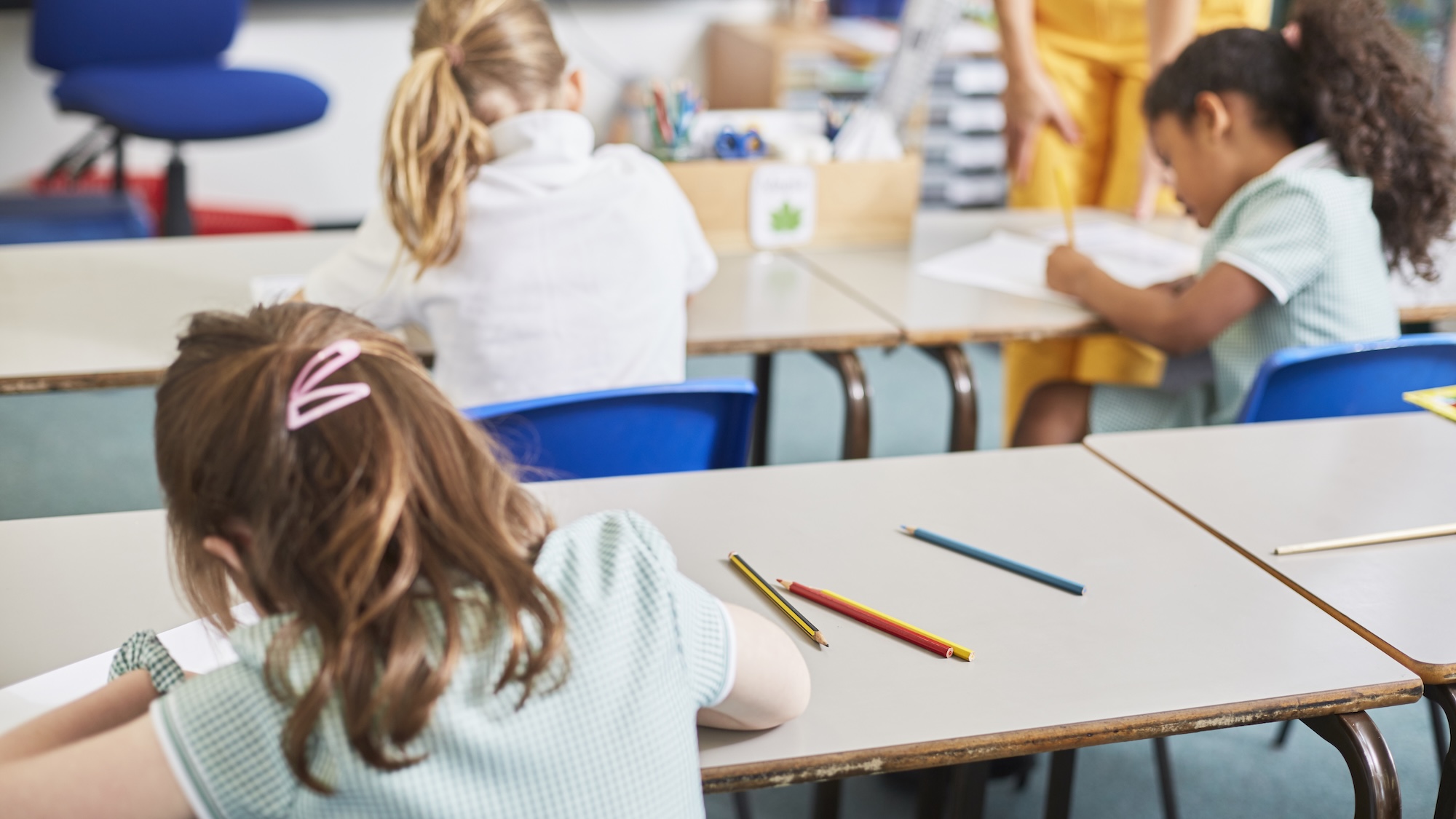How schools can support children’s mental health
The best have helped their students to build resilience during the challenges of the past year

A free daily email with the biggest news stories of the day – and the best features from TheWeek.com
You are now subscribed
Your newsletter sign-up was successful
- This article first appeared in The Week Independent Schools Guide 2021
The pandemic has taken its toll on young people’s mental health and wellbeing. Research commissioned by NHS Digital found that one in six children and young people experienced a mental health difficulty in 2020, compared with one in nine in 2017, while an Ofsted report revealed that the children hardest hit by school closures and restrictions had regressed in basic skills and learning. Some lost physical fitness while others showed signs of mental distress, including an increase in eating disorders and self-harm.
Deborah Woodman, a consultant clinical psychologist at Evelina London, one of only two specialist children’s hospitals in London, says children have expressed an increase in “general sadness” and worry during the crisis. While younger children were less able to articulate their worries and sometimes exhibited physical symptoms like tummy pains and headaches, older children talked about feeling lonely and missing their friends.
“It was very much the hope that the reopening of schools in September would have a stabilising effect and for some young people that was indeed the case,” says Dr Woodman. “But for other young people the increased anxiety about being out in the community and at school resulted in an increase in mental health difficulty.”
The Week
Escape your echo chamber. Get the facts behind the news, plus analysis from multiple perspectives.

Sign up for The Week's Free Newsletters
From our morning news briefing to a weekly Good News Newsletter, get the best of The Week delivered directly to your inbox.
From our morning news briefing to a weekly Good News Newsletter, get the best of The Week delivered directly to your inbox.
She believes that it’s crucial for resilience to be embedded in school structures and approaches, through peer mentoring programmes, mindfulness and relaxation techniques, exercise and developing safe spaces for young people within the school environment – “places where they can go when they feel overwhelmed”.
“It’s about having all those things in an ongoing curriculum within the school,” she says. “I hope that what we’ve gone through over the last year has reinforced the importance of the ‘healthy mind, healthy body’ approach to schools. It’s linked to academic excellence because you don’t really get one without the other.”
Writing in The Sunday Times, Lord Layard, the economist and co-author of Can We Be Happier?, and former cabinet secretary Lord O’Donnell took a similar view. “If you want to predict if a child will become a happy adult, the best predictor is not their qualifications but their emotional health,” they said.
It’s clear that schools have a crucial role to play in looking after young people’s emotional health, building their resilience and giving them the skills to cope with the challenges of the pandemic.
A free daily email with the biggest news stories of the day – and the best features from TheWeek.com
St Chris, a day and boarding school in Letchworth Garden City, has devised an initiative called GRIT (it stands for guts, resilience, initiative and tenacity) while Cumnor House Sussex, a co-ed prep school near Haywards Heath, has introduced its pioneering iSpace Wellbeing curriculum.
Created and developed in 2017 by Paula Talman, director of compliance, health and welfare at Cumnor House Sussex, and aimed at children aged four to 11, iSpace Wellbeing offers a child-friendly approach to wellbeing education. It is taught through the school’s PSHE (personal, social, health and economic education) timetable and encourages pupils to talk about their feelings and to know how and when to ask for help. iSpace stands for “I stop, pause and calm everything”.
Year 7 and 8 pupils have their own bespoke curriculum, #iWonder, which helps them to understand their emotional, physical, social and mental health. The school is currently trialling a Wellbeing Compass app to help them review their wellbeing, put together self-care tools and develop coping strategies at school and at home.
During the first lockdown, Cumnor House Sussex ensured that every child had a wellbeing session every week. “We carried on remotely and if anybody wanted a private conversation we booked that in as well,” says Mrs Talman. She believes that developing resilience – the ability to get through difficult or testing times – is important for all age groups so resilience training is part of
iSpace Wellbeing and #iWonder. “We teach resilience in a child-friendly way so they can take the concepts on board,” she says. “At the age of four they are introduced to the concept of resilience using a story about learning to ride a bike. You fall off but each time you fall off you learn something new. You become resourceful and you get back on. You keep progressing and you feel great.”
The children also learn about the successes and failures of people like basketball player Michael Jordan, writer JK Rowling and adventurer Bear Grylls, all of whom have spoken publicly about the failures they experienced before going on to be successful.
Handcross Park, a co-ed prep school for two to 13-year-olds in rural West Sussex, also uses the iSpace Wellbeing programme and sees it as a helpful way for children to articulate their feelings.
When the country went into the first lockdown the school asked its 380 pupils to record how they were feeling emotionally and physically in an online wellbeing journal. Children in years 4 and below talked to their tutors every day and the older children had PSHE time every afternoon.
“The children found the wellbeing journal very positive,” says Richard Clark, director of studies at Handcross Park. “A year 8 pupil told us: ‘You’ll never know how important it was to me. It really was a lifesaver.’ We also asked them to try and do a good deed each day and to identify something that they felt gratitude for.”
In September 2020 the school produced a questionnaire, asking the children about their self-esteem and their feelings about returning to school. The school prefects launched HXPTV, a TV channel that covers everything from mindfulness to how the brain works. The wellbeing prefect, a year 8 pupil, started an agony aunt service, answering light-hearted questions from younger children.Mr Clark is convinced that the pandemic has made the pupils more resilient. “Given the right tools, they showed they have the ability to adapt exceptionally well,” he says. “In a recent assembly I showed them a 1797 penny because I wanted to talk about the importance of valuing and cherishing the small things in life – which again is great for the wellbeing message.”
Rather than talking to children about “resilience”, Jonny Timms, headmaster of Walhampton, a co-ed day and boarding prep school in Lymington, Hampshire, prefers to use the term “bouncing back”.
“Bouncing back – the idea of weathering difficulties and learning from them – is more meaningful to a child,” he says. “If 2020 showed us anything it’s that we can’t predict the challenges that lie ahead so children need to become confident, resilient problem-solvers – and those skills are definitely teachable. Our staff are brilliant at encouraging our pupils to have a go at things. During lockdown in January they encouraged the children to build their own shelters, cook on a camp fire and then make a video to show the learning journey they had been on. They absolutely loved it.”
Teaching resilience is equally important for secondary pupils. At University College School (UCS) in Hampstead, north west London, resilience is one of the school’s four learning values, along with responsibility, relationships and resourcefulness. The school defines resilience as “approaching your learning with confidence, never giving up and always motivating and challenging yourself to become a better learner.”
“We are a highly selective school and we are never complacent about exam outcomes but we don’t want to be slaves to them,” explains Mark English, the school’s vice master and academic director. “We want to give our students an educational experience that is future-proof so we help them to develop strengths that will be useful in later life, not just enable them to pass exams in order to get them into the next stage of their education.”
When the school switched to online learning during lockdown, UCS staff took a series of steps to look after pupils’ mental health and wellbeing. They built in five-minute breaks between lessons so everyone could get offscreen, walk about and get a drink and snack. Teachers stopped all homework for years 7 to 10 and gave pupils more time during morning registration to interact, socialise and talk to each other and their tutors.
Strategies like these proved so successful that when pupils returned the school decided to keep the longer registration times and five-minute breaks between lessons. “It isn’t a headlong rush from 9am to 4pm anymore,” says Mr English. “We have tried to get a greater sense of balance and a less frenetic sense to the school day. Pastorally, our decision to give form tutors far more time with their forms is something we have preserved too.”
In his view the current cohort of pupils have become more resilient during the past year. “They think their way round obstacles and problems,” he says. “They are open to advice but they are very solution-focused and phlegmatic about things that crop up. They seem to be much more flexible in their mindset and able to think their way round things.”
For Mike Lamb, director of staff and pupil wellbeing at Hurst College, a co-ed day and boarding school for 1,200 pupils aged four to 18 in West Sussex, resilience is often learned through co-curricular activities. Rather than simply running online academic lessons during lockdown the school organised a full co-curricular programme and sport three times a week.
“For me, developing resilience is about providing pupils with lots of opportunities to do things they are good at and build their self-esteem and things they might not be so good at but help them to learn from the experience,” says Mr Lamb, who teaches biology and psychology.
“It’s about providing opportunities to succeed but, if they fail, putting them in a position where they can fail but still feel safe and supported. It’s also about having an ethos in school where everybody has a go. For example every pupil who joins us in year 9 will do dance. It helps to develop the ethos where it’s important to try but it’s important to fail.”
Matt Bull, deputy head (boarding and external relations) at Bloxham School in Oxfordshire, points out that even though resilience is a buzzword in the education world these days it’s something that has always existed in schools.
“Resilience is the ability to keep going and deal with what life throws at you,” he says. “We include it in our PSHE programme but it’s sometimes better taught through something else. For example, being part of a choir and trying to prepare for a service when you’ve got failing AV [audiovisual] equipment and you’re exhausted at the end of term is far more powerful than a one-off lesson on resilience. Or being on the side of a mountain in a Duke of Edinburgh’s Award expedition, cooped up with three people you don’t really know and having to navigate your way back – that’s the kind of resilience that’s often overlooked.”
In his view young people have been hugely resilient during the past year – “especially if you think about all the things that schoolchildren and university students are being denied right now that were life defining for our generation”.
He worries, however, about the increasing number of “lawnmower parents” in the world – those who “sit in front of the child and mow the grass before the child has even got on to it”. In other words, parents who try to protect their child from any type of struggle or obstacle.
“When they are at school children need to make mistakes,” says Mr Bull. “They always have done and they always will do. It’s our job as teachers to give them the spades to get out of the holes they have dug. That’s what resilience is all about.”
Mindfulness for all
Many schools have introduced mindfulness sessions to support pupils’ mental health and wellbeing, encouraging them to focus on the present by using techniques like meditation, breathing and yoga. Epsom College, for instance, has partnered with the Anna Freud Centre and is taking part in a study on the long-term benefits of mindfulness.
Mindfulness was introduced six years ago as part of Epsom’s PSHE curriculum and is now practised throughout the school.
“As much as we focused on delivering high-quality remote teaching and learning throughout lockdown and to those forced to self-isolate during the autumn, we also provided a full mindfulness and wellbeing programme remotely,” says headmaster Jay Piggot.
“Once pupils were back at Epsom, we delivered a full timetable of lessons and co-curricular activities. They volunteer their time for community initiatives, such as our virtual befriending service for local care home residents. All of these activities have helped to keep our pupils grounded, appreciative and resilient.”
Let’s give young people a pat on the back
When it comes to teaching resilience Jenny Price, deputy head pastoral at Godolphin School, a girls’ school in Salisbury, Wiltshire, thinks “the drip feed approach” works best. “I don’t think you can go into a PSHE lesson and say: ‘We’re going to do resilience today,’” she says. “We prefer to incorporate it into different parts of the curriculum, lessons, assemblies and activities like CCF, yoga and Zumba.”
She believes that kindness is a fundamental part of resilience – being kind to yourself and being kind to others. “Communication is important too,” she says. “A sign of resilience is knowing when to ask for help and being able to seek the right kind of help. We teach the girls that they’re going to come across things in life that don’t go their way but resilience is all about how they react, how they cope and how they set things right.
“I think this generation will be more resilient than previous generations. They have done amazingly well to crack on and keep positive during these times so let’s give these young people a massive pat on the back. When you ask some of our girls what they want to do in their careers, becoming scientists who can help make things better in the future are among their top jobs.”
During the pandemic an enterprising sixth former wrote a list of advice for those suffering with anxiety about Covid and the school posted it on its website. Her tips include the following:
- Restrict yourself to reading the news once a day.
- Create structure and make time for friends and exercise.
- Plan what you will do when all this is over and focus on self-care.
- Make time to talk to someone about your worries but keep it structured and regular.
- Breathing techniques are absolutely not over-rated as a coping mechanism for anxiety and stress, so establish your “go to” breathing pattern. Mine is: breathe in for seven seconds, breathe out for 11.
-
 Political cartoons for February 14
Political cartoons for February 14Cartoons Saturday's political cartoons include a Valentine's grift, Hillary on the hook, and more
-
 Tourangelle-style pork with prunes recipe
Tourangelle-style pork with prunes recipeThe Week Recommends This traditional, rustic dish is a French classic
-
 The Epstein files: glimpses of a deeply disturbing world
The Epstein files: glimpses of a deeply disturbing worldIn the Spotlight Trove of released documents paint a picture of depravity and privilege in which men hold the cards, and women are powerless or peripheral
-
 The pros and cons of banning cellphones in classrooms
The pros and cons of banning cellphones in classroomsPros and cons The devices could be major distractions
-
 School phone bans: Why they're spreading
School phone bans: Why they're spreadingFeature 17 states are imposing all-day phone bans in schools
-
 Schools: The return of a dreaded fitness test
Schools: The return of a dreaded fitness testFeature Donald Trump is bringing the Presidential Fitness Test back to classrooms nationwide
-
 Send reforms: government's battle over special educational needs
Send reforms: government's battle over special educational needsThe Explainer Current system in 'crisis' but parents fear overhaul will leave many young people behind
-
 Education: Can public schools be religious?
Education: Can public schools be religious?Feature A Supreme Court seems ready to rule in favor of religious charter schools in Oklahoma, which could reshape public education
-
 America's academic brain drain has begun
America's academic brain drain has begunIN THE SPOTLIGHT As the Trump administration targets universities and teachers, educators are eying greener academic pastures elsewhere — and other nations are starting to take notice
-
 Schools' Send crisis: how can it be fixed?
Schools' Send crisis: how can it be fixed?Today's Big Question Government urged to reform support for children with special educational needs and disabilities and save councils from bankruptcy
-
 Unschooling: the radical education trend raising eyebrows
Unschooling: the radical education trend raising eyebrowsUnder the radar Some parents are letting their children lead their education